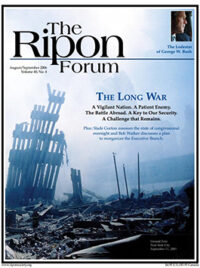One of the most important recommendations of the 9/11 Commission is to strengthen Congressional oversight. While the Congress acted promptly on Commission recommendations to restructure the Executive Branch, and while we have so far succeeded in preventing any further terrorist attacks in the United States, Congress has done little to reform itself.
Why does such reform matter? The answer is simple. All of the reforms in law, policy, and practice recommended by the Commission require the attention and guidance of the Congress if they are to be implemented and sustained over time. Difficult and complex reforms of our government are at risk if Congress is not a partner in helping them to succeed.
There is also a fundamental question of checks and balances. The Congress has created a powerful Director of National Intelligence and a National Counterterrorism Center. It has provided broadened investigative authorities to the Executive Branch, and authorized more intrusive transportation and border inspection measures. Under our Constitution, the Congress must also provide an effective check and balance on the actions of the Executive by conducting robust oversight over the exercise of these authorities.

Congress cannot play its proper role if its oversight committees are weak. Strong oversight by the Congress protects our liberties and makes our policies better. Our freedom and safety depend on getting this balance right.
So what should the Congress do?
First, the Committees on Intelligence and Homeland Security need to be powerful, standing Committees of the Congress, with sufficient and capable staff, strong investigative powers, and exclusive jurisdiction. They should not have to share jurisdiction or be subject to sequential referral over key elements in their jurisdiction. Reforms at the outset of the current Congress did not meet this test. There were some modest changes: the Senate Intelligence Committee removed term limits, reduced its membership, created an oversight subcommittee, and limited sequential referrals. Its House counterpart created an oversight subcommittee. On homeland security, both the House and Senate created permanent Committees, but the Senate Committee has authority over only 30 percent of the Department of Homeland Security’s budget, and 8 percent of the Department’s personnel.
The Intelligence Committees should have sole jurisdiction over the National Intelligence Program. The Homeland Security Committees should have sole jurisdiction over all counterterrorism elements of the Department of Homeland Security. There should be clear lines of accountability, both by the Executive to the Congress, and by congressional oversight committees to the public. The public needs to know which committees have responsibility for oversight.
Second, there should be Appropriations subcommittees that clearly track the jurisdiction of the authorizing committees. It is clear that the Congress will not create a single Intelligence Committee with both authorization and appropriation powers, as the Commission originally recommended. The next best solution is to create appropriations subcommittees for intelligence that track the jurisdiction of the authorizing committees, as the Congress has done for homeland security.
Strong oversight by the Congress protects our liberties and makes our policies better. Our freedom and safety depend on getting this balance right.
To underscore the weakness of the current system of oversight, note that the Congress did not complete action on either an Intelligence or Homeland Security authorization bill for this year. Prospects for FY ‘07 look no better. The Committees are too weak, or too divided, to guide the legislation to completion. In the absence of policy guidance from the responsible committees charged with oversight, who is minding the store?
We should not place our confidence in congressional oversight structures for national security that were designed at the beginning of the Cold War. The Nation needs to reform all its national security institutions.
The first order of business for the 110th Congress should be to reform its own Committee structures to meet the security challenges of a new era.
Slade Gorton served on the National Commission On Terrorist Attacks Upon the United States. Previously, he represented Washington State in the U.S. Senate. He is currently Of Counsel at Preston, Gates & Ellis.




